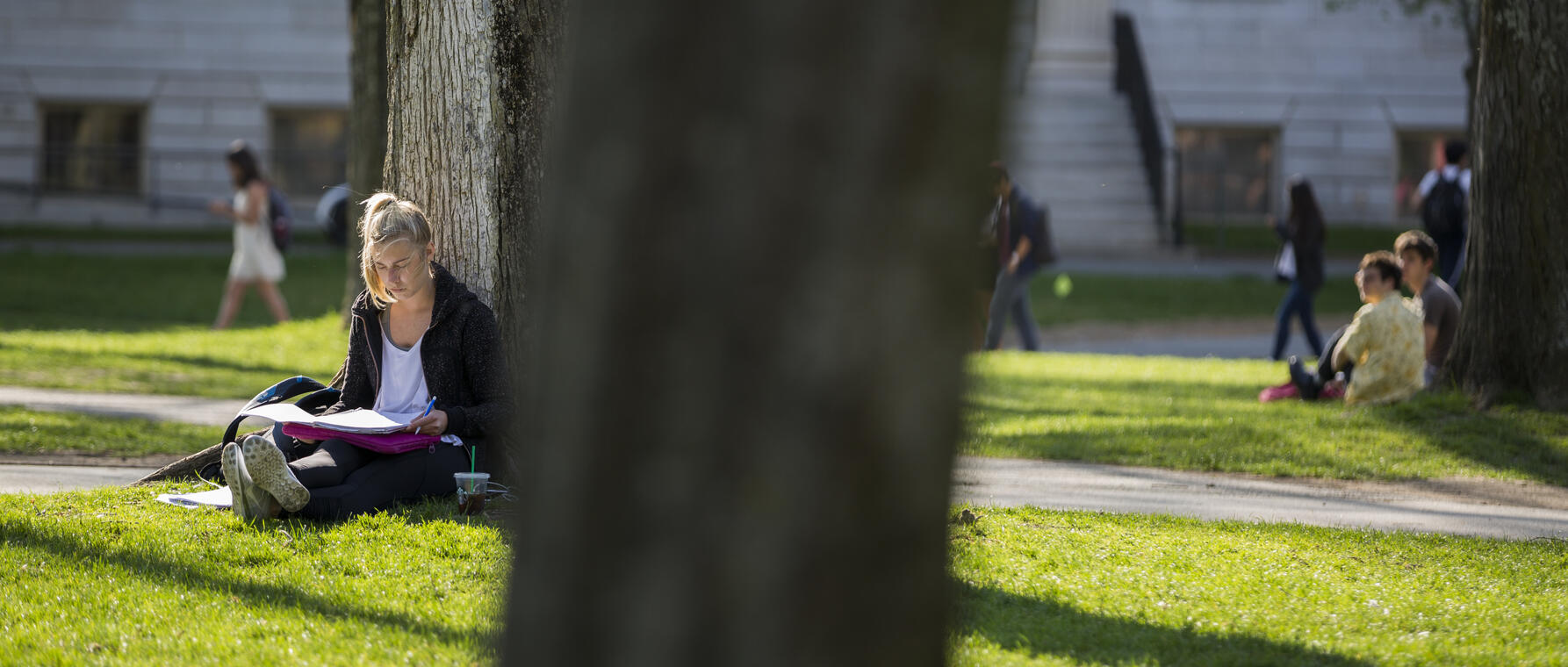Be Well: Welcome from Counseling and Mental Health Services
Advice and resources for caring for yourself as a Harvard student

As a new academic year begins, the Harvard campus comes alive again with crisp autumn air, familiar pathways, and the energy of fresh possibilities. Whether you are arriving at Harvard for the first time or returning to continue your studies, it always feels new. There’s a mix of excitement, anticipation—and often a good dose of uncertainty. It’s natural to wonder how you will find your place, manage new demands, or reconnect after a summer apart. The good news is, you don’t have to have it all figured out right away.
At Counseling and Mental Health Services (CAMHS), a department of Harvard University Health Services (HUHS), we know that graduate school is its own life chapter, a stepping stone toward your goals and dreams. All of us have been in your shoes at one point and we offer words of encouragement below.
You Are Not Alone
Students often share that the insecurity of being new can lead to a self-imposed pressure to “get things right.” It helps to remember that it's okay to feel like a beginner again.
CAMHS Access Clinician Sarah Rayner notices a repeat pattern among students. “A surprising fact I learned is how prevalent imposter syndrome is among new and returning students alike,” she says. “It may be a comfort to remember that these feelings exist, even if there’s not always a way for classmates to express these feelings to each other during the busier parts of the year.”
According to Dr. Tara Cousineau, leader of the CAMHS workshop “Overcoming Perfectionism Through Self-Compassion and Befriending the Inner Critic,” students sometimes forget the natural and acquired skills they have and persistence that brought them to Harvard in the first place. “It's understandable that once you find yourself immersed in a community of high achievers, the stakes feel really high,” she says. “The experience can trigger the inner critic and negative comparisons. It can take some time to adjust to a new year. Be kind to yourself.”
It's understandable that once you find yourself immersed in a community of high achievers, the stakes feel really high. The experience can trigger the inner critic and negative comparisons. It can take some time to adjust to a new year. Be kind to yourself.
—Dr. Tara Cousineau
A Few Skills to Keep You Grounded
Janet Lawrence, facilitator of the CAMHS’ Recovery Support Group offers one of her favorite quotes from A.A. Milne: “You are braver than you believe, stronger than you seem and smarter than you think.” That's a timeless reminder whenever trying something new—whether in fictional Pooh’s Hundred Acre Forest or on Harvard’s campus.
She also offers this practice from cognitive behavioral therapy (CBT): Invite yourself to be curious about your first thought or thoughts of the day, especially if negative or a worry. Is it a fact or an opinion? Do you have any evidence that it is true? Do you have evidence it is not? Then create a more realistic, optimistic thought and let that lead your perspective and mood for the day. For example, consider the thought, "I'm not smart enough to be here.” Look at the evidence. You got accepted, didn't you? You put in the effort, right? A reframe could be, “Even though I'm nervous, I deserve to be in this program and I’ve met challenges before.”
Dr. Rue Wilson, co-leader of CAMHS’ Grieving and Coping Together Support Group, suggests getting outside. “Harvard’s campus is filled with beautiful outdoor spaces, from wide open greens to small, quiet corners,” she says. “These places often surprise with their richness of nature, revealing something new in every season. Consider getting to know one spot well—perhaps even keeping a photographic record of its changes over time. Simply noticing and being present with nature can be deeply restorative. What matters most is getting outside each day, in every kind of weather. After all, as the author Alfred Wainright once said, ‘There's no such thing as bad weather, only unsuitable clothing.’”
CAMHS counselor Carmen Cruz encourages students to keep it simple. “When feeling overwhelmed, remember to pause and breathe,” she says. “Simply focusing on an inhale and exhale for a minute can keep you steady and calm.”
You are braver than you believe, stronger than you seem and smarter than you think.
—A.A. Milne
CAMHS Can Support You
If you aren't aware yet, the CAMHS is located on the 4th floor of the Smith Campus Center. Our staff includes more than 30 clinicians and six administrative team members who are passionate about working with graduate students from all disciplines and backgrounds. We reflect diverse cultural, racial, and life experiences—and we bring that diversity to our care for you.
“Research shows that seeking support strengthens resilience and reduces stress," says CAMHS counselor Josué Miranda Quiles, “Reaching out to faculty, mentors, advisors, or campus counseling resources can make a meaningful difference. Asking for help is not a sign of weakness, it’s a strategy for growth, well-being, and long-term success.”
Getting started is simple. Your first step is an initial consultation with a CAMHS access clinician, which you can schedule through the HUHS Patient Portal or by calling our front desk. During this 20–25-minute phone conversation, you’ll have the chance to share your concerns and consider next steps together.
Additional resources include:
- support groups and workshops on topics such as perfectionism, grief, recovery, and mindfulness
- urgent care appointments (in person or by phone), plus the CAMHS Cares line (617-495-2042), available 24/7
- medication consultation and management from CAMHS psychiatrists
- TimelyCare, a virtual platform offering free telehealth counseling and health coaching, and self-guided wellness resources.
“Don't hesitate to reach out and use the resources and support available at CAMHS. No concern is too small or too big to address,” says Cruz. “You deserve to prioritize your mental health and well-being—and we're here to help every step of the way.”
The CAMHS website is the best place to find up-to-date information on services, staff bios, groups, and resources. You can view the CAMHS Graduate Orientation presentation to get a sense of what is offered.
Graduate school is more than academic progress—it is a deeply human experience. Alongside your intellectual pursuits, you will grow in resilience, creativity, and connection. There will be days when you feel uncertain or overwhelmed, but you don’t need to go through them alone. Remember to give yourself the same compassion you would extend to a friend—and call on the strength you already carry within you. We’re glad you’re here—and we’re here for you.
Get the Latest Updates
Join Our Newsletter
Subscribe to Colloquy Podcast
Simplecast





